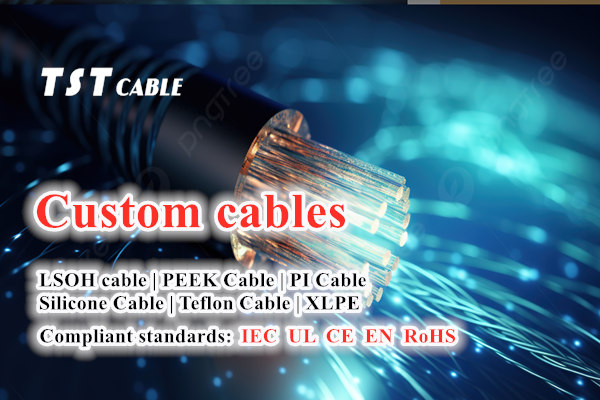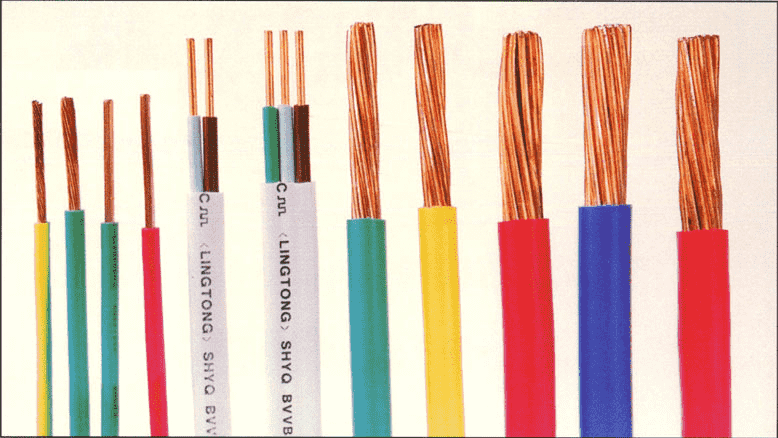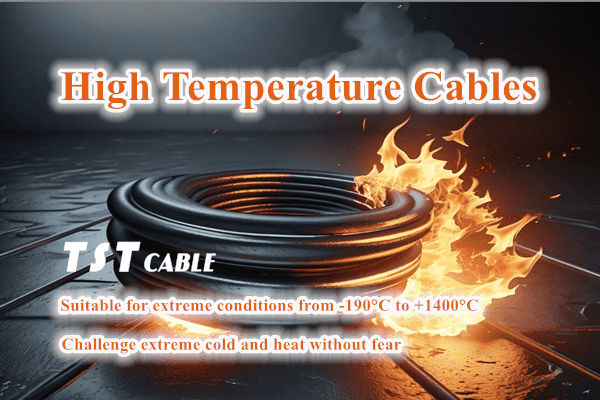Are you looking for high-temperature Teflon cables that can operate stably at -200°C to 260°C? TST CABLES will introduce the characteristics of different materials of high-temperature Teflon cables (PTFE, PFA, FEP, XLETFE, ETFE, ECTFE, PVDF).

- Introduction to High-temperature Teflon Cables
Teflon (Teflon) is a polytetrafluoroethylene (PTFE) material with excellent high-temperature resistance. Teflon is widely used in many industrial fields, such as chemical, aviation, automobile and medical equipment.
High temperature Teflon cable usually refers to cables using polytetrafluoroethylene (PTFE), tetrafluoroethylene-perfluoroalkoxy vinyl ether copolymer (PFA), fluorinated ethylene propylene copolymer (FEP), cross-linked polytetrafluoroethylene (XLETFE), ethylene-tetrafluoroethylene copolymer (ETFE), ethylene-chlorotrifluoroethylene copolymer (ECTFE) and polyvinylidene fluoride (PVDF) as insulation and sheath materials. These materials are widely used in a variety of industries due to their excellent high temperature resistance, chemical corrosion resistance and electrical insulation performance. - High temperature Teflon cable material characteristics and temperature range
The high temperature range of Teflon varies depending on different models, thicknesses and processing methods. Generally speaking, Teflon can withstand the following temperatures: - Short-term temperature resistance: around 260°C (430°F).
- Long-term temperature resistance: In actual applications, Teflon can usually withstand temperatures up to 260°℃ (430°F), but long-term use at this temperature may cause material aging and performance degradation.
Polytetrafluoroethylene (PTFE): PTFE is a highly stable fluoropolymer with short-term temperature resistance up to 260°C and long-term use temperature range of -196°C to 260°C (430°F).
Tetrafluoroethylene-perfluoroalkoxy vinyl ether copolymer (PFA): PFA is similar to PTFE, but has a lower melt viscosity, making it easier to process into complex shapes. PFA has an operating temperature range similar to PTFE, but has better mechanical strength at high temperatures.
Fluorinated ethylene propylene copolymer (FEP): FEP also has good high temperature and chemical resistance and an operating temperature range of about -200°C to 200°C.
Cross-linked polytetrafluoroethylene (XLETFE): PTFE has mechanical strength and heat resistance enhanced by chemical cross-linking and has a temperature range similar to PTFE.
Ethylene-tetrafluoroethylene copolymer (ETFE): ETFE has high wear and tear resistance and an operating temperature range of about -70°C to 150°C, but some special grades of ETFE can withstand higher temperatures.
Ethylene-chlorotrifluoroethylene copolymer (ECTFE): ECTFE has good chemical resistance and mechanical strength, and the operating temperature range is about -65°C to 150°C.
Polyvinylidene fluoride (PVDF): PVDF has excellent weather resistance and chemical corrosion resistance, and the operating temperature range is about -46°C to 150°C.
It should be noted that the above data is for reference only. The temperature range in actual application may be affected by factors such as material quality, thickness, processing method and environmental conditions. When you choose Teflon material, please be sure to refer to the product manual or email TST CABLES engineers to obtain accurate temperature resistance information.
- High-temperature Teflon cable structure
The structure of high-temperature Teflon cable usually includes:
Conductor: Copper or silver-plated copper conductor for efficient transmission of power or signals.
Insulation layer: One or more of the above-mentioned Teflon materials provide electrical insulation and protection.
Jacket layer: Some cables may also include an additional Teflon jacket or other material jacket to enhance mechanical protection and environmental protection.
Shielding: Cables may contain metal braid or foil shielding where electromagnetic interference needs to be reduced.
- High-temperature Teflon cable industry applications
Due to the excellent performance of Teflon cables, they are widely used in the following industries:
Chemical industry: Control and signal cables for conveying corrosive liquids or gases.
Oil and gas industry: Cables for offshore platforms, drilling platforms and refineries.
Aerospace: Teflon cables provide reliable electrical connections in extreme temperature and high altitude environments.
Automobile manufacturing: Used in high-temperature areas near engine compartments and exhaust systems.
Food processing: Teflon’s non-stick and easy-to-clean properties make it suitable for food contact applications.
Medical equipment: Cables for MRI machines, X-ray equipment, etc. that require high purity and low signal interference.
Military and defense: Used for communications and control systems in harsh environments.
High-temperature Teflon cables play an irreplaceable role in various fields with their excellent performance and wide applicability. With the continuous advancement of materials science and engineering technology, the future of Teflon cables will be brighter, providing more possibilities for industrial and social development.
- Special properties and advantages of high-temperature Teflon cables
Special properties
High and low temperature resistance: Teflon materials have a wide temperature resistance range, from low temperature -200°C to high temperature above 260°C, and can maintain good physical and electrical properties even at extreme temperatures.
Chemical corrosion resistance: Teflon materials have excellent resistance to most chemicals, including acids, alkalis, solvents, etc., which allows cables to be safely used in harsh environments such as the chemical industry.
Low friction coefficient: Teflon has an extremely low friction coefficient, which means that dirt and corrosive substances are not easily attached to the surface of the cable, making it easy to clean and maintain.
High dielectric strength: Teflon cables have high dielectric strength and can withstand high voltage without breakdown, making them suitable for high-voltage power transmission and signal transmission.
Non-stickiness: Teflon’s non-stickiness reduces the possibility of cable accumulation of contaminants during use, especially in applications in the food processing and pharmaceutical industries.
UV and radiation resistance: Teflon materials have good UV and radiation resistance, making them suitable for cable applications in outdoor and high-radiation environments.
Advantages of high-temperature Teflon cables
Long life: Due to the above special properties, Teflon cables have a long service life, reducing the frequency of replacement and reducing the total cost of ownership.
Reliability: It can still maintain stable performance under extreme conditions, improving the overall reliability and safety of the system.
Versatility: Teflon cables are suitable for a variety of environments and applications, from chemical plants to aerospace, almost omnipotent.
Customization: According to specific application requirements, different diameters, lengths, colors, and shielding and sheath materials can be customized to meet diverse requirements.
Environmental protection: Teflon materials produce less waste during the production process, and some materials can be recycled, which is in line with the concept of environmental protection.
- Future trends of high-temperature Teflon cables
With the continuous advancement of science and technology and the diversification of industrial needs, high-temperature Teflon cables are also developing continuously. The future trends mainly include:
Material innovation: Research and develop new Teflon materials to further improve the temperature resistance, chemical resistance and mechanical properties of cables.
Intelligence: Integrated sensors and intelligent monitoring systems enable cables to self-diagnose and warn, improving the intelligence level of the system.
Lightweight: Reduce the weight of cables by improving materials and design, especially in aerospace and mobile devices.
Environmentally friendly materials: Develop more environmentally friendly Teflon alternatives to reduce environmental impact and meet the needs of green manufacturing.
High-performance composite materials: Combine Teflon with other high-performance materials, such as carbon fiber, metal wire, etc., to enhance the mechanical strength and tensile properties of cables.
Cooperate with Teflon cable manufacturer TST CABLES to customize (PTFE, PFA, FEP, XLETFE, ETFE, ECTFE, PVDF) cables
TST CABLES Teflon cables challenge the limits of modern industry. Excellent temperature resistance, easy to operate between -200°C and 260°C; anti-corrosion, no fear of chemical erosion. Flexible and wear-resistant, stable transmission, escort your equipment. Aerospace military quality, make every meter of cable a model of safety and efficiency. If you have any needs for Teflon cables or want to place a sample order, please feel free to contact us by email or phone.
Also available in:
English




